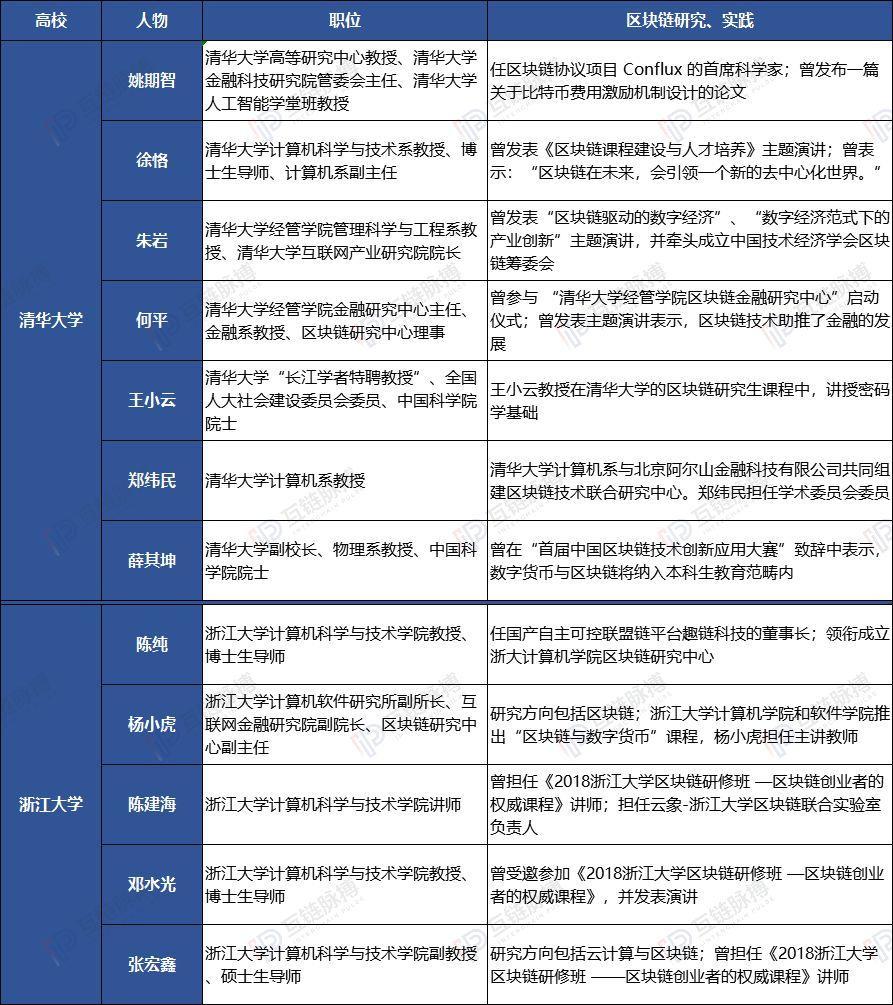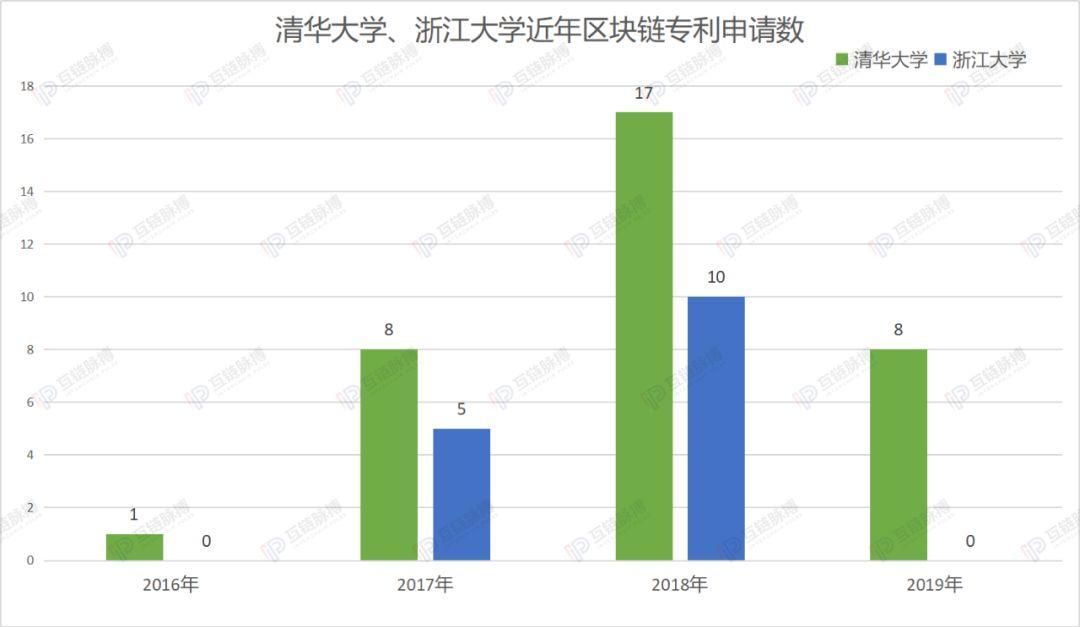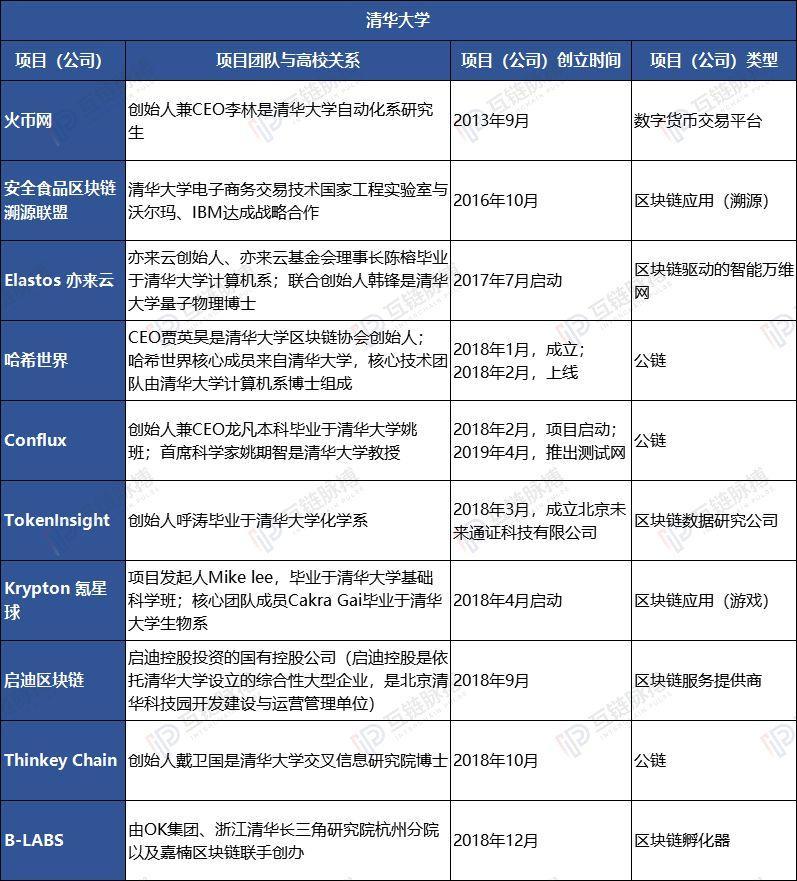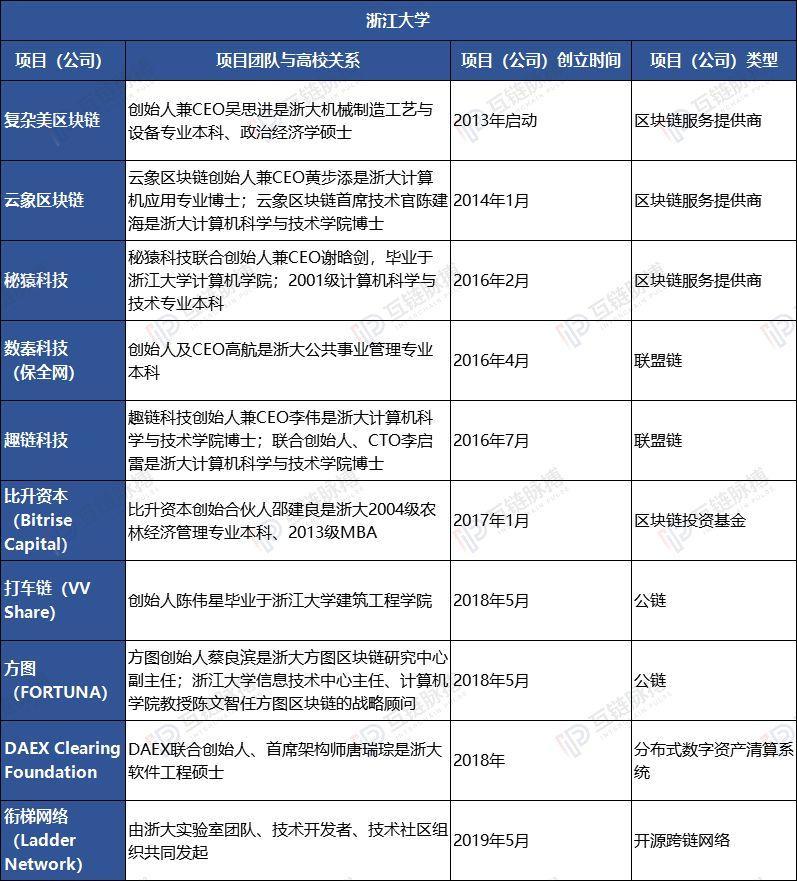Who is the "Whampoa Military Academy" in the field of blockchain in China?
The hero does not ask for the source. But looking at the current industry, whether it is a big man, or a new star of the Unicorn company, most of them still come from well-known institutions in academia.
The same is true in the blockchain field, where university talents are spread across all areas of the blockchain industry to promote the development of blockchains. Among them, Tsinghua University and Zhejiang University, which are known for their computer strength, are an important exporter of this talent and a talented person.
The northern part of Tsinghua University, along with a long history, has a profound knowledge, and joins the famous teacher and Zhiyuan. The founders of blockchain projects such as Firecoin, Conflux, Yelaiyun, and Hash World all came from Tsinghua.
Nanpai Zhejiang University relies on a good industrial development environment, combining production and learning, and attaches importance to innovation and practice. The founders of interesting chains, cloud elephants, and complex beauty graduated from Zhejiang University.
- Interpretation of the Ethereum Yellow Book (3): The Economic Mechanism behind Gas and Transaction Fees
- Libra Utopia and China's Legal Digital Currency Opportunity
- New Plan of Ant Blockchain and New Trends of BAT Blockchain Strategy
While cultivating talents and incubation projects, the two universities also attach importance to the development of blockchain teaching and research in schools, and have successively offered courses, applied for patents, and set up laboratories.
Then, compared with the two top universities in China, the Tsinghua Department and the Zhejiang University will become the “Whampoa Military Academy” in the blockchain field.
Research and exquisite thinking in the school: Tsinghua University and Zhejiang University go hand in hand
The essence of martial arts lies in the acquisition of solid basic skills.
Tsinghua University and Zhejiang University are also well versed in this. While exporting a large number of blockchain talents, it is also making efforts to lay a solid foundation for the blockchain teaching and research in schools. The teaching mainly includes courses and teachers resources; the research includes patents and laboratories.
Mutual chain pulse observation, as blockchain technology is gradually recognized by more people, Tsinghua University and Zhejiang University have opened related courses in recent years.
Earlier in Tsinghua University, in September 2017, the postgraduate course "Saibo Smart Economy and Blockchain" was opened. This is also the first postgraduate blockchain course in China and the world. The course system teaches the concept of cyber's smart economy, the operating system that supports the smart economy, and the role of the blockchain in the new operating system. Xu Wei, a professor of the Department of Computer Science and Technology at Tsinghua University, and Wang Xiaoyun, a Distinguished Professor of the Yangtze River Scholar, participated in the course.
In the following 2018, Zhejiang University also launched a series of blockchain courses. In May, Zhejiang University launched the "2018 Zhejiang University blockchain training class – the authoritative course of blockchain entrepreneurs", which was taught by three professors and teachers of the School of Computer Science and Technology. Later in November, the School of Computer Science and Software College of Zhejiang University launched the “Blockchain and Digital Currency” course. It is reported that the course material is compiled and published by Zhejiang University teachers, "blockchain technology advancement and actual combat."
In addition, the inter-chain pulse has also counted the resources of professors and lecturers in the research blockchain field of the two universities. It is worth noting that in the statistics, the teachers of Tsinghua University and Zhejiang University have academicians sitting in the town: Professor Yao Zhizhi of Tsinghua University is the academician of the Chinese Academy of Sciences and the only Chinese winner of the Turing Award; Professor Chen Chun of Zhejiang University is an academician of the Chinese Academy of Engineering.
In terms of quantity, there are 7 professors and lecturers in the field of blockchain research and practice in blockchain in Tsinghua University, and 5 in Zhejiang University. Among them, the five professors and lecturers of Zhejiang University belong to the School of Computer Science and Technology. The professors and lecturers in the research blockchain field of Tsinghua University are not only from the computer department, but also from the finance department and the physics department.

(tabulation: interchain pulse)
Furthermore, in terms of observational research, the innojoy platform data of the inter-chain pulse statistics was searched by “blockchain”. The main applicants belonged to Tsinghua University with 34 patent applications; the main applicant belonged to Zhejiang University with 15 items. In this category, Tsinghua University seems to be better than Zhejiang University.
From the application year, there are 1 Tsinghua University 2016; 8 in 2017; 17 in 2018; 8 in 2019; Zhejiang University is relatively concentrated in 2017 and 2018, with 5 and 10 respectively. Number of blockchain patent applications.

(Cartography: Interchain Pulse)
In addition to patent applications, the two schools also have a layout for laboratories and innovative research centers. From 2017 to 2018, two universities have set up several blockchain laboratories.
In February 2018, Tsinghua University-Yonghui Intelligent Supply Chain Management Joint Research Institute was established. In May, Tsinghua University's blockchain education and industry alliance “Qingteng Chain Alliance” was established, and China's first blockchain innovation experiment platform “Qingteng Blockchain Alliance” was released.
In June 2018, Tsinghua University established the Tsinghua x-lab blockchain laboratory. It is reported that the x-lab blockchain acceleration camp is the first acceleration plan in China based on the business service blockchain direction.
In July 2018, the School of Economics and Management of Tsinghua University decided to set up a Digital Financial Assets Research Center, which was donated to Bitcoin to the School of Economics and Management of Tsinghua University. Also in July, Tsinghua University established the “Industry Trusted Blockchain Application Technology”. Joint Research Center."
The blockchain research center of Zhejiang University was launched earlier than Tsinghua.
In 2017, the blockchain studio of the Center for Internet and Innovation Finance of Zhejiang University was established.
In May 2018, the Fangtu Blockchain Research Center of Zhejiang University was formally established. In June, Zhejiang University set up a research center to promote technical research and personnel training in blockchain, and the Future Information Technology Research Center of the School of Computer Science and Technology of Zhejiang University was unveiled.

(Cartography: Interchain Pulse)
Based on the blockchain teaching and research situation of Tsinghua University and Zhejiang University, the two universities can be said to be in the same place, and they are all in the same place in 2016 and 2017. The research scope covers multiple areas in the blockchain field. aspect.
The mechanics of the ivory tower: the Tsinghua Department and the Zhejiang University
At the same time, the inter-chain pulse observed that the blockchain practice of Tsinghua University and Zhejiang University was not limited to the campus. The students who came out of the ivory tower also joined the blockchain field, and continued the research and practice of the blockchain of the university.
The inter-chain pulse has carried out statistics on the incubation of Tsinghua University and Zhejiang University and the blockchain projects (enterprises) established by college graduates, and selected 10 items for further comparative analysis.
According to the statistical sample, the projects of Tsinghua University and Zhejiang University were first started in 2013, but the projects of Tsinghua University broke out more in 2018, and the projects of Zhejiang University were mostly distributed before 2017. The project types of Tsinghua and Zhejiang University are mostly blockchain service providers and public chain projects.

(tabulation: interchain pulse)

(tabulation: interchain pulse)
At the same time, observing the two groups of samples, it is not difficult to see the familiar items and characters. There are fire currency nets, Conflux, Yilaiyun, and Hash World in the Tsinghua Department; there are complex beauty, cloud elephants, and interesting chains in the Zhejiang University. In the blockchain field, Li Lin and Chen Weixing are also from the two universities.
1. Blockchain Daxie: Chen Weixing of Li Linzhai Department of Tsinghua University
Li Lin is a graduate student in the Department of Automation at Tsinghua University and the founder and CEO of Firecoin. He founded the Firecoin Network in 2013, which is now China's largest digital asset trading platform and digital asset financial services provider.
The relationship between Firecoin and Tsinghua is not limited to Li Lin. The chain of pulses has been observed. Recently, China Fortune has also cooperated with Tsinghua University.
In April of this year, Firecoin China and the Wudaokou Finance College of Tsinghua University jointly compiled a case of enterprise development transformation, which was included in the China Financial Case Center of Wudaokou Financial College of Tsinghua University. It is reported that this case will be used for daily teaching and research.
Just last week (September 18th), Firecoin China also established a cross-border digital capital research center in cooperation with the Wudaokou Financial College of Tsinghua University. After the cooperation, the fire currency will help Wudaokou Financial College conduct in-depth research in the field of digital assets.
On the other hand, the great university of Zhejiang University is the founder of Pancheng Capital and the fast taxi driver Chen Weixing. He graduated from the School of Architecture and Engineering of Zhejiang University.
Chen Weixing was the founder of the original fast taxi, and later founded the venture capital institution Pancheng Capital. After withdrawing from the management of Didi, the exploration of the blockchain began, and the digital asset exchanges such as the currency security and the fire currency network were invested. The quantum chain, the original chain, the Babbitt and the Martian Finance were successively invested. , VNT, chain and other blockchain projects.
In addition, Pancheng Capital has also carried out in-depth layout based on various links of the blockchain industry, involving mines, mining pools, mining, exchanges, wallets and other projects. In May 2018, Chen Weixing announced the joint development of the blockchain project, the taxi chain, with the US co-founder Yang Jun.
2. Blockchain project under the group of colleges and universities
Mutual chain pulse observation, the blockchain project of Tsinghua University and Zhejiang University is not only built by college graduates, but also the subsidiaries of the enterprise groups under the two institutions are practicing blockchain.
The representative of the Tsinghua Department is the enlightened blockchain. Beijing Qidi Blockchain Technology Development Co., Ltd. is a state-owned holding company invested by Qidi Holdings. Qidi Holdings is a comprehensive large-scale enterprise established by Tsinghua University. It is the development, construction and operation management unit of Beijing Tsinghua Science and Technology Park. It is understood that the main development direction of the Enlightenment blockchain is in the areas of government affairs, health, and finance.
In May of this year, Qidi Digital Group and Qidi Blockchain also signed a four-party cooperation agreement with Future International and Shaanxi Digital Group to carry out project cooperation, technology research and development, industrial application, talent training and data assets in smart cities and digital government. Cooperation in the park and other aspects.
The representative of Zhejiang University is the chain technology. In August 2016, the chain of interest received a total of 17.5 million yuan Pre-A round of financing from Sunyard, Zhejiang University, and Junbao Communications.
Among them, Zhejiang University New Technology Co., Ltd. is an information technology consulting and service listed company under the Zhengzheng Holding Group of Zhejiang University. It once said on the investor interaction platform that the company invested in the interest chain technology, which specializes in blockchain technology research and development. The company invested 5 million yuan and currently holds 7.22% of the equity chain technology.
In addition, it is reported that the core team of Fun Chain Technology is mainly from Zhejiang University. The chairman of the company is the academician of the Chinese Academy of Engineering, the professor of the School of Computer Science of Zhejiang University, Chen Wei, the CEO Li Wei, the CTO Li Qilei and other management teams graduated from the Zhejiang University School of Computer Science and received a doctorate.
3. More controversial Tsinghua Department project
In addition to the above blockchain projects, the interlinkage pulse observation, the remaining Tsinghua Department projects, seems to be more controversial than the Zhejiang University project.
First and foremost is the Conflux project that launched the test network in April this year. Long Fan, founder and CEO of the project, graduated from Yaoban University of Tsinghua University; the chief scientist is the only Asian winner of the Turing Award, and Professor of the Department of Interdisciplinary Information Science at the Tsinghua University.
At the same time, the project research scientist is Assistant Professor and Assistant Dean of Interdisciplinary Information Science at Tsinghua University, Xu Wei, Associate Dean of the School of Finance and Technology of Tsinghua University, and Director of the Blockchain Research Center. Co-founder Zhou Dawei also graduated from Yaoban of Tsinghua University. According to the official website, 6 of the 8 members of the engineering team are from Tsinghua University.
When the blockchain industry showed a downward trend, the project won the financing of 35 million US dollars from Sequoia, Shunwei and Metastable. It has aroused media attention and caused some controversy. For example, the white paper copied the GHOST of Israeli scholars, and whether Professor Yao Zhizhi participated in the project is true. The Conflux project team also responded to the questions.
It is reported that the main network of the project is expected to start in the fourth quarter of this year, and it remains to be seen how the future will develop.
Prior to this, the Yelai cloud project, launched in July 2017, is also a well-known blockchain project and the first Internet operating system to create a blockchain to centralize the Internet. Chen Yu, the founder of the project and chairman of the Yilai Cloud Foundation, graduated from the Department of Computer Science at Tsinghua University; co-founder Han Feng is a Ph.D. in quantum physics at Tsinghua University.
Looking at the non-small data, there was a glory after the ELA went online. Especially in February 2018, the highest price touched 650 yuan, but the price of the cloud is only about 14.5 yuan. That is, after the price of ELA plummeted, the project was called the reputation of Tsinghua University, and it was also referred to as a blockchain scam.
The Tsinghua project, which was also controversial because of the bleak market, is Krypton. It is understood that the project's founder Mike lee graduated from Tsinghua University's basic science class; core team member Cakra Gai graduated from the Department of Biology of Tsinghua University; chief scientist Yang Lin and consultant Sun Jianfeng graduated from Tsinghua University. Krypton fell sharply shortly after the opening and was highly controversial.
4. More low-key Zhejiang University
Compared with the Tsinghua Department, the blockchain projects of the Zhejiang University seem to have started earlier and are more low-key.
Wu Sijin, founder and CEO of Complex America, is a master of mechanical engineering and equipment and a master's degree in political economy from Zhejiang University. In 2013, the company launched the research and development and innovation of blockchain and smart contracts; in 2014, it applied for the first blockchain invention patent: wallet recovery function; authorized in December 2017. The main project direction of the company is blockchain bills, receivables, prepayments, exchanges, etc. It has been launched in the blockchain projects of many financial and power giants in the United States.
Huang Butian, founder and CEO of Yunxiang Blockchain, is a Ph.D. in computer application at Zhejiang University. Chen Jianhai, chief technology officer of Yunxiang Blockchain, is a Ph.D. student at the School of Computer Science and Technology of Zhejiang University. The project was founded in 2014, relying on Zhejiang University and the National University of Singapore to establish a joint lab for blockchains in the two places.
Xie Yujian, co-founder and CEO of Peru Technology, graduated from the School of Computer Science, Zhejiang University; 2001 undergraduate in Computer Science and Technology. At the same time, Xie Yujian also had the only Chinese member of the core research team of Ethereum in Ethereum. In July 2016, Peru Technology released CITA, a fully-developed enterprise-level blockchain infrastructure platform, and opened its code to the world in July of the following year.
Gao Qin, founder and CEO of Digital Technology, graduated from Zhejiang University with a major in Public Administration. The project is one of the earliest entrepreneurial teams in the field of blockchain in China. It is reported that at present, Digital Qin Technology has formed a business structure based on the security chain, the security network as the entrance, the judicial identification of Qianxin electronic evidence as the support, and the digital trust trusted data circulation platform as the application. And has provided solutions for China Insurance Information Technology Corporation, China Securities Information, Guangzhou Information Center, the Ministry of Communications Road Network Center, the highest inspection, food and drug supervision, Hangzhou Bank, Hangzhou Daily and other units.
College-assisted blockchain practice is further advanced
The above outlines the series of practices from the blockchain teaching and research of the Tsinghua Department and the Zhejiang University to the blockchain project. Both universities have made useful explorations in the blockchain field and exported many talent resources. But in fact, the blockchain layout of China's colleges and universities is far more than that. With the help of Tsinghua University and Zhejiang University and the help of many domestic schools, China's blockchain is moving forward.
We will continue to update Blocking; if you have any questions or suggestions, please contact us!
Was this article helpful?
93 out of 132 found this helpful
Related articles
- Interpretation of the most popular asset valuation model in the encryption circle EoE: MV=PQ
- Mining from entry to proficiency (2): mining form summary and investment priority
- Market analysis on September 30: BTC weekly line is not optimistic, you need to be cautious when you are long
- Encrypted Notes | Harmony proposes the "impossible four corners" theory, the extended dilemma enhanced version
- Chainlink's first Chinese trip ended successfully, opening a trip to South Korea today
- 2019 blockchain landing application report: cross-border trade
- Babbitt interviewed to find real use cases for blockchain, Blockstack wants to sand in the app waves





